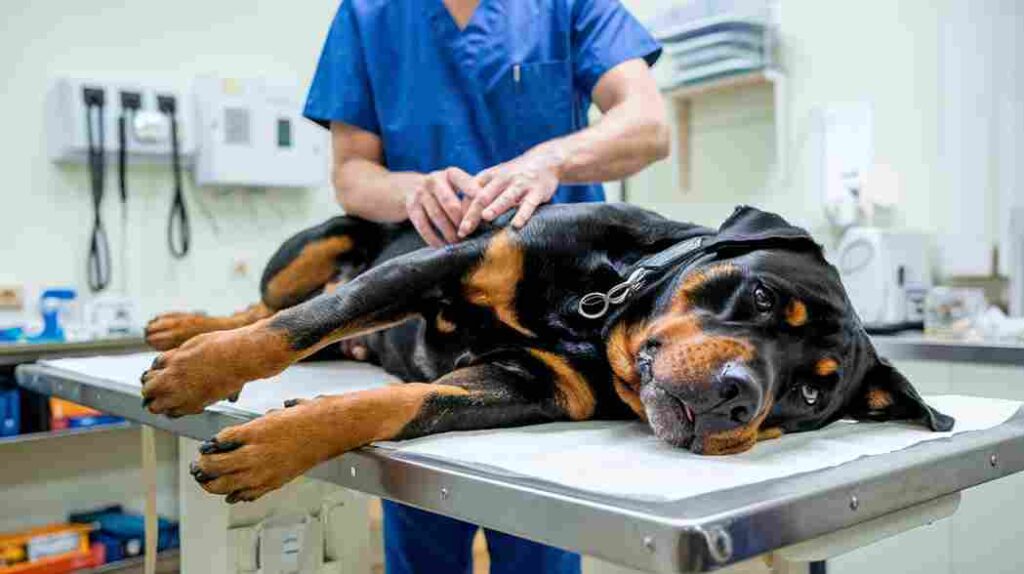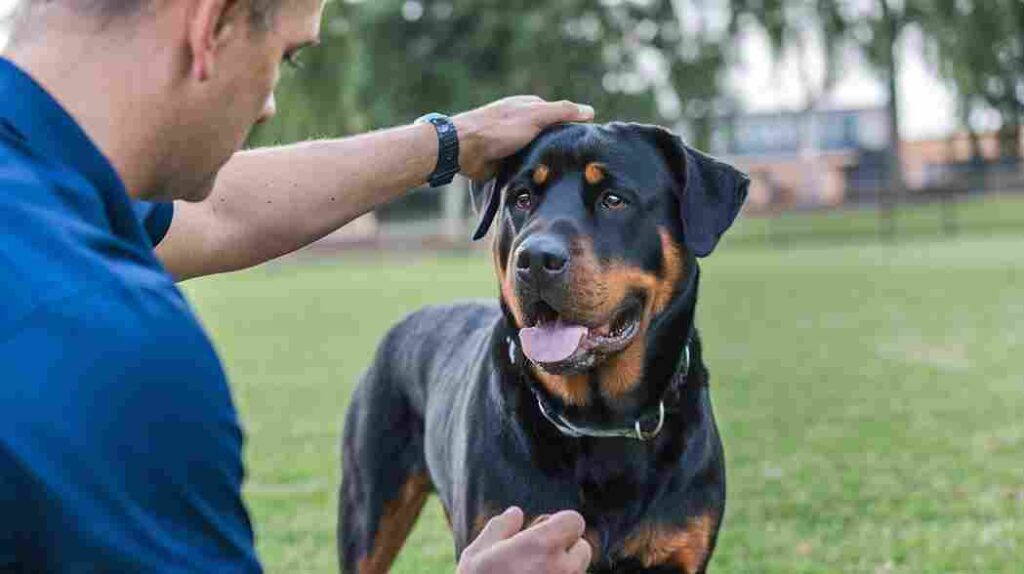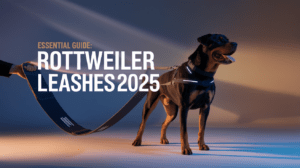Understanding Rottweiler weaknesses is crucial for anyone considering this magnificent breed – trust me, I’ve seen my fair share of surprised faces in the clinic! While these powerful pups might look like they stepped straight out of a superhero movie, they’re not invincible.
According to the American Kennel Club’s 2023 health study, nearly 40% of Rottweilers experience at least one major health concern during their lifetime. But don’t let that scare you away!
Let’s dive into the real, unfiltered truth about Rottweiler vulnerabilities – not to discourage you, but to help you become the informed, prepared owner your future four-legged friend deserves. After all, knowing is half the battle, and the other half is usually cleaning up dog hair!
Common Health Vulnerabilities in Rottweilers

Let’s face it – our brawny buddies aren’t built like Nokia 3310s! While Rottweilers look tough on the outside, they’re hiding some genetic predispositions that every owner should know about. According to a comprehensive study published in the Journal of Veterinary Medicine, Rottweilers rank among the top breeds predisposed to certain hereditary conditions.
Hip and Elbow Dysplasia
Picture a door with loose hinges – that’s essentially what happens with hip and elbow dysplasia in Rottweilers. These joint conditions affect about 35% of Rottweilers, as reported by the Orthopedic Foundation for Animals’ latest health study. The telltale signs? Your muscular friend might start moving like they’re doing a reluctant dance – limping, struggling to rise, or giving you the “not today” look when it’s time for walks.
Heart Problems and Aortic Stenosis
Here’s where these tough cookies show their softer side. Aortic stenosis – fancy medical speak for a narrowed heart valve – is like having a clogged pipe in your plumbing system. Watch for signs like fatigue, panting excessively, or your pup acting more like a couch potato than usual. Early detection is key, so regular vet check-ups are non-negotiable!
Eye Issues and Progressive Retinal Atrophy
Remember how grandma always said not to read in the dark? Well, Rotties can’t help their deteriorating vision! Progressive Retinal Atrophy (PRA) is like having a dimmer switch slowly turned down on your dog’s eyesight. The good news? These adaptable champs usually adjust remarkably well, though they might start bumping into that new furniture you just bought.
Von Willebrand’s Disease
Think of this as your Rottie being a bit too similar to a hemophiliac royal from history. This inherited blood-clotting disorder means even minor cuts could become drama central. Don’t panic though – with proper awareness and precautions, most Rotties with this condition live perfectly normal lives, just with extra band-aids in the first-aid kit!
Prevention Tips:
- Regular health screenings (mark those calendars!)
- Genetic testing before breeding
- Maintaining healthy weight (yes, those puppy eyes during dinner must be resisted)
- Joint supplements (think of them as your pup’s daily vitamins)
- Moderate exercise (no marathon training!)
For a more comprehensive look at Rottweiler health concerns and how to prevent them, check out our in-depth guide: Rottweiler Health 101: A Guide to Common Issues & Preventative Care. This detailed resource walks you through everything you need to know to keep your four-legged friend healthy and thriving.
Temperature and Environmental Sensitivities

Think your Rottie is as weatherproof as a postal worker? Think again! These black-coated beauties might look tough, but they’re surprisingly sensitive to environmental conditions. According to the American Veterinary Medical Association, dark-coated breeds like Rottweilers are particularly susceptible to temperature extremes.
Heat Intolerance and Risk of Overheating
Remember that black car you couldn’t touch in summer? That’s basically your Rottie’s coat! Their dark, dense fur acts like a heat magnet, and their muscular build means they generate extra body heat. Signs your pup is doing their best impression of a melting ice cream? Excessive panting, drooling like a broken faucet, and giving you that “Why have you forsaken me?” look during afternoon walks.
Cold Weather Challenges Surprise!
Despite their German heritage, these pups aren’t exactly snow bunnies either. While they handle cold better than heat, their short coat doesn’t provide the same winter protection as their fluffier cousins. Think of them as that friend who always borrows your jacket – they might need an extra layer when the mercury drops!
Living Space Requirements
Here’s where size really matters! These gentle giants need their space – and no, that closet-sized apartment won’t cut it. A Rottie in a tiny space is like trying to parallel park a truck in a compact spot – technically possible, but not ideal! They need room to stretch those massive muscles and turn around without reorganizing your furniture.
Exercise Limitations in Extreme Weather
Forget marathon training in July or polar expeditions in January! Your Rottie needs their exercise schedule adjusted like a seasonal wardrobe. Short, early morning or evening walks in summer, and quick, brisk activities in winter are your best bet.
Weather-Smart Tips:
- Create indoor exercise alternatives
- Invest in cooling mats and kiddie pools for summer
- Consider doggy boots for hot pavements
- Provide cozy, draft-free sleeping spots
- Monitor outdoor activity time
Just remember, your Rottweiler’s environmental comfort isn’t just about luxury – it’s about safety and health! Like a fine wine, these dogs need the right conditions to thrive. Keep them comfy, and they’ll keep being your faithful (albeit sometimes dramatic) companion!
Behavioral Challenges and Training Difficulties

Ever tried negotiating with a toddler? Well, training a Rottweiler can sometimes feel just like that – except this toddler weighs 100 pounds and has impressive jaw strength! A study in the Applied Animal Behaviour Science journal ranks Rottweilers among the more challenging breeds to train, though not for lack of intelligence.
Stubborn Nature and Strong Will
Let’s be real – your Rottie didn’t get the memo about you being the boss! These independent thinkers often have their own agenda, like deciding that “sit” means “sit only if there’s a treat involved.” Their stubborn streak runs as deep as their loyalty, making consistency in training absolutely crucial.
Dominance Issues
Think of your Rottie as that friend who always wants to be project leader. These natural-born supervisors need clear boundaries, or they’ll happily promote themselves to CEO of your household! Without proper training, their leadership aspirations can lead to challenging behaviors, especially during adolescence.
Prey Drive Management
That squirrel in your backyard? Your Rottie sees it as a personal challenge! Their natural hunting instincts can turn a peaceful walk into an impromptu drag race if something catches their eye. While this drive makes them excellent guardians, it can also mean your arm gets a surprise workout during walks.
Early Socialization Needs
Like awkward teenagers at their first dance, Rottweilers need help learning social skills. Missing the critical socialization window (before 16 weeks) is like skipping orientation day at a new school – it makes everything harder later! They need positive exposure to different people, pets, and situations early on.
Training Success Tips:
- Start training early (like, yesterday!)
- Use positive reinforcement (treats are your friend)
- Stay consistent (no mixed messages)
- Practice patience (Rome wasn’t built in a day)
- Seek professional help when needed (no shame in the training game!)
If you’re looking to tackle these training challenges head-on, we’ve got you covered. Jump into our complete Rottweiler Training Guide [Expert Tips & Techniques] where we break down exactly how to transform these behavioral challenges into opportunities for growth. You’ll discover step-by-step training techniques that really work for this powerful breed.
Social and Emotional Vulnerabilities

Think your Rottie is all muscle and no feels? Think again! These emotional powerhouses pack as much sensitivity as they do strength. Research from the Journal of Veterinary Behavior shows that Rottweilers rank surprisingly high in emotional sensitivity among working breeds.
Separation Anxiety
Remember that dramatic goodbye scene from every romance movie? That’s your Rottie when you grab your car keys! Their separation anxiety can turn your living room into a renovation project. From orchestrating a choir of howls to redecorating your sofa, these velcro dogs take “missing you” to an art form.
Over-Attachment to Family
These gentle giants don’t just join your family – they become your shadow! While their devotion is heartwarming, it can sometimes feel like having a 100-pound smartphone tracking your every move. Bathroom break? Get ready for an audience. Kitchen visit? Suddenly you have a sous-chef!
Interaction with Other Pets
Your Rottie might think they’re a lap dog, but other pets might disagree! Their size and enthusiasm can be overwhelming for smaller animals. Think of them as that overeager friend who doesn’t understand personal space – lovable but needs some coaching in social etiquette.
Children Safety Concerns
While they’re natural protectors, their size and strength can unintentionally turn playtime into an adventure sport. It’s like having a friendly bear as a babysitter – wonderful but needs careful management!
Emotional Balance Tips:
- Establish consistent daily routines
- Practice gradual alone-time training
- Create a safe, comfortable space
- Use positive reinforcement
- Consider a pet companion if suitable
- Never punish anxiety behaviors
Just remember, your Rottweiler’s emotional sensitivity isn’t a weakness – it’s what makes them such incredible companions! They love hard, play hard, and yes, sometimes worry hard. But wouldn’t you rather have a dog that cares too much than too little?
Care and Maintenance Challenges

Think owning a Rottweiler is just about love and cuddles? Well, your wallet might beg to differ! These magnificent beasts come with maintenance requirements that can make your credit card feel like it’s doing CrossFit. According to the American Kennel Club’s ownership cost analysis, large breed dogs like Rottweilers rank among the most expensive to maintain properly.
High Food Costs
Let’s talk about those grocery bills! Your Rottie’s appetite is like a black hole – constantly hungry and capable of devouring astronomical amounts. These big eaters need high-quality food to maintain their muscular build, and we’re not talking about the budget brand at your local store. Expect to serve restaurant-quality meals to your four-legged friend!
Regular Grooming Needs
Despite their short coat, these guys are secret shedders! Think of them as confetti machines in dog form – constantly celebrating by spreading their fur everywhere. Regular grooming isn’t just about keeping your house from looking like a furry winter wonderland; it’s essential for their skin health too.
Exercise Time Commitment
Own a Rottie? Congratulations, you’ve just gotten yourself a four-legged personal trainer! These energetic pups need significant daily exercise, or they’ll redecorate your home out of boredom. We’re talking about dedicated time blocks that make your calendar look like a fitness instructor’s schedule.
Medical Expense Considerations
Remember those health vulnerabilities we talked about earlier? Well, they come with price tags! Veterinary costs for Rottweilers can make your human healthcare bills look reasonable. From regular check-ups to potential surgeries, your emergency fund might need its own emergency fund.
Cost Management Tips:
- Consider pet insurance early (seriously, do it!)
- Buy quality food in bulk
- Learn basic grooming skills
- Invest in preventive care
- Create a dedicated “Rottie fund”
- Schedule regular vet check-ups
Let’s be honest – maintaining a Rottweiler properly isn’t cheap. But can you really put a price tag on those loving brown eyes and loyal heart? Just think of it as investing in the world’s best security system that doubles as a heating pad and triples as a comedy show!
FAQ: Common Questions About Rottweiler Weaknesses
What is the biggest weakness of a Rottweiler breed?
The most significant challenge isn't their physical health - it's actually their emotional sensitivity combined with size and strength. While hip dysplasia gets more attention, a recent study in Frontiers in Veterinary Science suggests that behavioral and emotional needs pose the biggest challenge for owners. These gentle giants require consistent training, socialization, and emotional support to prevent anxiety-related behaviors that can be difficult to manage in such a powerful breed.
Are Rottweilers naturally aggressive, or is it a training issue?
This is actually a misconception! Rottweilers aren't naturally aggressive - they're naturally protective. There's a big difference! Their guarding instincts can be misinterpreted as aggression when it's really just their innate desire to protect their family. Poor training, lack of socialization, or anxiety are typically the root causes of any aggressive behavior, not natural temperament.
What makes Rottweilers unsuitable for first-time dog owners?
Think of Rottweilers like a high-performance sports car - powerful, beautiful, but requiring skilled handling! Their combination of strength, intelligence, and stubbornness can overwhelm inexperienced owners. They need someone who can:
- Provide consistent training
- Read dog body language
- Handle their physical strength
- Manage their emotional needs
- Afford their maintenance costs
Can Rottweilers overcome their genetic health predispositions?
While you can't change genetics, you can significantly minimize their impact! Through proper breeding selection, early health screening, appropriate exercise, quality nutrition, and regular veterinary care, many Rottweilers lead healthy, active lives despite their genetic predispositions. It's like having a family history of heart disease - you can't change your genes, but you can make lifestyle choices that promote better health.
Remember, every breed has its challenges, and Rottweilers are no exception. But with proper understanding, preparation, and care, these magnificent dogs can be incredible companions. Their weaknesses don't define them - they just make them more endearingly human!
Are Rottweiler Weaknesses Deal-Breakers?
Like any superhero, Rottweilers have their kryptonite – from health issues to emotional sensitivities. But here’s the truth: their weaknesses make them stronger companions when properly understood and managed. While they might not be the easiest breed to handle, their unwavering loyalty, intelligence, and loving nature make them worth every challenge.
Curious to learn more about what makes your Rottie truly special? Our in-depth article, 101 Amazing Rottweiler Breed Facts: History, Temperament & Care, reveals fascinating details about this remarkable breed. Understanding these key facts will not only help you tackle common challenges but also deepen your appreciation for your four-legged friend’s unique heritage and traits.






